- Home
- Kruger, Mary
Rogue's Charade Page 4
Rogue's Charade Read online
Page 4
“Well...I don’t suppose you have any rope by you, do you, princess?”
“Rope? No. What in the world for?”
“I’d tie you up. Not tight, of course, but—”
“You would, wouldn’t you?”
“Think, princess. ‘Twill make you appear more my captive.” His eyes twinkled. “Good props are always handy.”
“We’re not in a play,” she retorted. “God help us, you’re enjoying this, aren’t you?”
“I’m alive, princess.” His voice was soft. “‘Tis more than I expected from this day.”
Blythe glanced quickly at him, but his face, so mobile, was wiped clean of expression. She couldn’t trust him, of course. Keep up her end of the bargain, help him escape, and who knew what he would do? He was an escaped murderer, a criminal with no scruples, and he’d use her as he wished. If she didn’t go along, however, what was likely to happen? At the very least, she’d be hurt. He was desperate; he’d have to do something to keep her from calling attention to him. And he was right. The longer she stayed with him, the less likely it was that anyone would believe her. Oh, she was in a dreadful coil, and what she was to do about it, she didn’t know.
Simon’s brow was cold with sweat as he staggered along, glad of his captive’s arm to lean on. Damn, but his leg hurt. Though a quick inspection had shown that the musket ball had only creased his skin, it had bled profusely and now, covered by a rag torn from his shirt, blazed with pain. The only good thing about the wound was that it was high on his leg, where the dark cloth of his breeches wouldn’t show the blood. Unless he started bleeding again. And if he did, thereby giving away his identity, no use of props would save him.
“There’s a crowd ahead,” Blythe said. “What shall we do?”
They were on St. George Street, which, by the size of the crowd ahead, led to Westminster Bridge; to their right rose the Gothic towers of the Abbey. Simon paused a moment, thinking. Damn, if only he’d time to powder his brows, as well. He’d have to make do with facial expressions, to simulate age. “We’ll turn here,” he decided, swinging her into a wide grassy area, leading to the north entrance of the Abbey, heading toward the river. There lay his best chance of escape.
“You’ll be caught.”
“Not yet.” He injected confidence and strength into his voice. If she knew how he really felt, how scared he was, she’d escape from him in a minute, and that wouldn’t do. He truly did need her, at least until he was out of London. And, to be honest, she was turning into an intriguing companion. Quarrelsome, maybe, but a blessing. At least, he’d thought so when he’d seen her walking in Portman Square. Under the stairs where they’d hid from the soldiers, with her close against him, his mind thought had been only of escape. Only when he’d pulled off her cap had he suddenly thought differently. Sweet Jesus, he was a desperate convict, but he was also a man, and any man would be affected, tempted, by Miss Blythe Marden when she let her hair down. Without her cap, her honey-colored hair tumbled past her shoulders, making her appear at once younger, prettier, more vulnerable. More striking yet was the streak of paler hair arching back from her brow like a thunderbolt, an unusual and arresting feature. Pity such hair had to be covered, he thought, looking at her slantwise and seeing her pale face, her tight lips. Pity when she was so unexpectedly attractive and alluring, and not just because he had been months without a woman. Skilled as he was at disguise, aware of the impact even a small change could have, he knew well that that pale streak of hair would make her far more memorable to the soldiers that chased him. He wondered if she realized that, and the power it gave her. He devoutly hoped not. It would be good to end this day with a whole skin.
Blythe shifted under the heavy weight of his arm. “How much farther?”
He looked up from under his brows. “Just until we’re over the bridge. Then I’ll let you go.”
“Pish.”
“Do you doubt me, princess?”
“Huh. After these past hours?”
“Now, you wound me, you do. Have I actually hurt you?”
“You’ve abducted me! And—”
“Hush, princess, not so loud,” he said, as a man passing by glanced at them. “We’re nearly there.” Already he could smell the river, the mingled odors of fish and tar, and other, less wholesome things, for the Thames was the sewer of London, as well as its water supply. Though he could not see it for the maze of old buildings that pressed closed together along the waterfront, still he had no doubt that they were near the crossing. “To the Rubicon, it is,” he muttered.
“What?”
“Nothing to worry yourself about, daughter.”
“No. You’re the one should be worried. If I scream—”
“Then I’ll have to kill you, won’t I?”
His voice was so matter-of-fact that Blythe faltered. “With people as witnesses?”
“Aye, but I’m a condemned murderer already. What is one more death on my conscience?”
Blythe swallowed, hard. There was a glint in his eye that warned her not to pursue the subject, a dangerous glitter of desperation and recklessness. So far he’d not hurt her, and in truth she didn’t think he would. He was an actor, after all, and could be playing a part. But he was, as well, a murderer. She would do well to remember that, and do as he commanded. Once away from London, perhaps she could escape. “What would you have me do?”
“Act properly submissive, as a daughter should,” he said promptly, the glint in his eyes deepening. “If that is not too difficult for you.”
“I’ll have you know I’m a very proper daughter.”
“Are you, now? And do you always speak to your father as you do to me?”
“But you’re not—oh, never mind,” she said, exasperated. “Very well, I’ll be a proper daughter. Though you are a most improper father.”
His arm twitched. “I hope not.” His face was oddly grim as he looked up. Their faltering progress had brought them to an intersection, thronged with people and carts and other conveyances with disgruntled drivers. “Ah. Westminster Bridge.”
Westminster. Blythe repeated the name to herself. She’d seen little of London since arriving to become Mrs. Widget’s companion, having stayed more or less in Marylebone. She would have to remember the route she took now, when he finally let her go. If he let her go. “There’s a crowd.”
“I expected it. Can you see the bridge, daughter?”
What?” Blythe peered ahead, and through the crowd could just see a massive stone railing. “Yes.”
“I am an old man, and frail. I need you for support, and when I talk I don’t always make sense. Tell me what you see.”
“People.” Blythe frowned. “A great many, heading to the bridge, but slowly. I wonder—ah!”
“What?”
“There are soldiers on the bridge.” Her voice dropped involuntarily. “I can’t see how many, but there are at least three and they’re at this end.”
“A barricade. I might have known.” His voice sounded grim. “Are any of them familiar?”
“I don’t know—no, I don’t think so.”
“Well, that’s something at least.”
“You’re surely not going to try to cross here?”
“All the bridges will be barricaded, daughter, and the others are across the city. Nothing to do but to see it through,” he said, as he pulled her forward, into the mass of humanity waiting to cross. “Mind your part, now.”
“Yes, Mr.—Father.”
He grinned quickly, no more than a flash of teeth. “Oh, a dutiful daughter. What’s all this crowd, then?” he said, raising his voice in the complaining, thin tones of infirm old age.
A man ahead of them turned, his glance amused. “Soldiers, old man. Stopping everyone who wants to cross.”
“Soldiers? Stopping a man from traveling in his own country?” Simon’s voice trembled with indignation and weakness. “Something should be done, I say!”
“There’s an escaped murderer loose, hav
en’t you heard?”
“A murderer!” Blythe exclaimed, injecting the proper notes of horror and fear into her voice. It wasn’t hard. “Father, did you hear that?”
“What is this world coming to?” he muttered, pressing down on her arm as they staggered forward a few steps. “Murderers running around loose, while soldiers stop innocent people. I tell you, daughter, this is a wicked world.”
“Yes, Father. I wish we’d never left Tunbridge.”
He peered up at her. “Eh?”
“Tunbridge Wells, Father. Do you not remember? His mind isn’t what it once was,” she explained in a low voice to the man ahead of her, who watched them with amusement. “To think he was once one of the finest preachers in the south of England—”
Simon choked. “My hearing’s still good, missy, don’t you forget that.”
“Yes, you old fool,” she muttered.
“Eh?”
“Of course, Father.” Her voice was clearer now, and she exchanged glances with the other man. Odd, but what she was doing felt natural, right. She had that strange sense of disassociation again, that feeling that she was standing outside herself watching; that sense of wonder as from somewhere inside she found the proper words and actions. Never had she done such a thing before today, or had she? She frowned as they neared the approach to the bridge. Yes, she’d played the dutiful daughter before, and if the stakes hadn’t been quite so high as they were now, still it had been important.
“Mind your step, Father.” She reached out to help him onto the bridge, and felt his large, cool hand close over hers. For a moment she was aware only of the contact, the touch of his skin, soft from his confinement, and yet hard as only a man’s hand could be. Large, and very strong. She’d no doubt he could wreak mayhem upon her with those hands, with violence. Or caresses.
Blythe stumbled, and this time it was Simon who saved her, though he staggered, too. “Mind your step, daughter,” he scolded. “You’ll land us in the river.”
“I’m sorry, Father. The soldiers are just ahead,” she added in a lower voice.
“How many?”
“Three—no, four. Three regulars, and an officer.”
“And the barricade?”
“They’ve got a cart across to block the way, and they’re questioning people as they come near.”
Simon nodded. “As I expected. You’ll have to answer their questions.”
“Me! But there are two of us.”
“I’m a senile old fool. You’ll handle it.”
“But what will I tell them? Where we are going, where we’ve been—”
“Think of something. Quickly, now. We’re almost there.”
Blythe bit her lip. Only a few people stood before her and the crude barricade. Two soldiers barred the way, while the officer frowned thunderously at the people he questioned. At the other end of the cart another soldier stood, musket held ready, as traffic entered the city. Leaning against the solid stone railing of the bridge was yet another man, watching the proceedings with a detached and yet curious air. He was a most stylish figure in a dark blue frock coat edged with braid, with an embroidered waistcoat and a fine fall of lace at his throat. He appeared harmless, a spectator only, Blythe thought, until her gaze met his. His eyes were hard, cold, glittering, making her look quickly away, a chill chasing through her in spite of the day’s warmth. Her world was all topsy-turvy when she felt more menace from a curious stranger than from the escaped criminal beside her.
“You, there!” the soldier barked, as Simon, tugging on her arm, shuffled, forward. “Halt!”
“Father!” Blythe exclaimed, grabbing Simon’s arm to hold him back. “Father, wait.”
“Eh?” He squinted up at her, hand cupped to his ear in a parody of deafness. Oh, this was terrible. He’d leave her to get them out of this mess. “What’s that you say?”
“We have to stop,” she said, enunciating clearly, and at the same time more aware than she had ever been of her accent, pure Kent. “Father, please. There’s some problem.”
“Problem?” Simon’s lids drifted shut. “Anno domini, veni, vedi, vecit,” he muttered.
“‘Ere, what’s that he’s saying?” the soldier asked, musket held across his chest. “Sounds foreign.”
“He’s praying,” Blythe improvised, hoping that that was indeed the effect Simon intended. “He’s—”
“Is there a problem here?” the officer said, from behind the soldier.
“Ave Maria, gratia plena,” Simon muttered.
“My father’s upset,” Blythe put in, nearly choking. It was one thing to try to fool the soldier with schoolboy Latin, but officers were traditionally upper-class. This man might very well recognize Simon’s doggerel for what it was. “My father prays when he’s upset, and—”
“Name?” the officer barked.
“Er—Sally Smythe. With a ‘y,’ not an ‘i’.”
“And his?” A jerk of the thumb towards Simon.
“Hieronymous,” she blurted out, and felt Simon’s arm jerk. “The Reverend Hieronymous Smythe.”
“Reverend, eh?” The officer peered down at Simon, eyes narrowed. “Where’s his collar, then?”
“He doesn’t always wear it. In truth, sir”—Blythe’s voice lowered—“he’s not quite right in the head.”
“Eh?” Simon squawked. “What is that you say?”
“I said you have trouble hearing, Father.”
“Eh?” He twisted his head, hand to his ear. “Nothing wrong with my hearing.”
“Only if you shout,” she muttered.
“Eh?”
“What is afoot, sir?” She looked directly up at the officer, deliberately batting her eyes. “I heard something about an escaped prisoner.”
“That is our problem,” the captain said loftily. “Were you in town to see the hangings?”
“Goodness, no! We spent the day at Mr. Poole’s in St. Margaret Street. He is a retired minister, like my father.”
“And he’ll vouch for you?”
“Of course he will, and his daughter and housekeeper, as well!” Blythe let indignation creep into her voice. “Do I look as if I consort with criminals?”
“Where are you from?”
“Tunbridge Wells.”
The officer’s glance was sharp. “You’ve a ways to go, then.”
“We will be staying with relatives in Lambeth. The, ah—”
“Smythes?” the officer put in.
“Certainly not! My dear mother’s family. They are Ramsbottoms,” she added proudly.
Beside her Simon jerked again. “Ramsbottom?” the officer said, his eyes narrowed.
“An old family, sir, goes back to the Domesday Book. Wool, you know. There are those who say”—she leaned forward—“that my mother married below herself.”
“And where is your mother?”
“Gone these past five years, and Father hasn’t been himself since.” She shook her head, casting a sorrowful glance at the man who leaned against her, lips silently moving and gaze blank. “He is all I have, now.”
“Er, yes.” The officer was frowning, and Blythe wondered if he had believed a thing she said. “I think—”
“Please, sir, may we pass? My father is not strong and I fear for what will happen if he’s made to stand much longer.”
The officer waved his hand in dismissal. “Yes, yes, go on. Shall I summon a hackney for you?”
“Oh, no, ‘tisn’t far, and I fear we cannot afford it. But I do thank you for your kindness. Good day to you, sir.”
“Good day,” the officer said absently, his attention now on the crowd behind Blythe and Simon. They were beyond the barricade, onto the bridge. Free. Almost.
“You’re an accomplished little liar,” Simon said through the side of his mouth.
“Father, such a thing to say! Someone is watching us,” she went on, her voice low, urgent.
Simon’s steps immediately faltered, and she staggered under his weight. “A soldier?”
/>
“No. There’s a man nearby, watching everyone—there, he’s looked away.”
“Who is he?”
“I don’t know, but there’s something about his eyes.” She shuddered. “He scares me more than the soldiers.”
“Likely no one of importance.” He twisted his head to look at her. “Hieronymous? Ramsbottom?”
“The officer didn’t believe Smythe, even with a ‘y,’” she retorted. “And what of you, spouting Latin?”
“Ramsbottom,” he mused. “So now I know what you think of me.”
“If you didn’t already.”
“Careful, princess. I’ve not let you go, yet.”
Blythe stepped from the bridge onto solid ground at last. They were out of the city. “When will you?”
“Soon.” He continued to limp along beside her, as if he really were infirm. “When we’re well away from the bridge.”
“But—”
“Think, princess. If the soldiers see you coming back without me, they’ll be suspicious. And they’ll remember you. They’ll remember those names.”
“Then I’ll return by another route.”
“You’ll have to.” From his cramped, hunched position Simon peered ahead. Compared to London, Lambeth was rural, with the great Tudor bulk of Lambeth palace rising to their right, and fields surrounding them. He was more exposed than he had been within London’s crowded streets, and yet he felt safer already. Lord knew he’d never expected things to turn out as they had. He’d be better traveling alone; he’d make faster time. But until he was certain he was away from danger, he needed the woman upon whose arm he leaned. The strain of the day showed on her face. What would happen when it came time to part, he could not say. She was a danger to him, though perhaps not in the way he’d first thought.
The golden light of early evening surrounded them as they emerged at last from the village into the countryside, their shadows falling long before them. “The sun will set soon. If I’m to be back in London before nightfall, I’d best go.”
Simon glanced back along the dusty road, and seeing no one paying them heed, straightened at last. “If you have a place to go to.”
“Of course I do. I told you, I’ve a position as companion—”

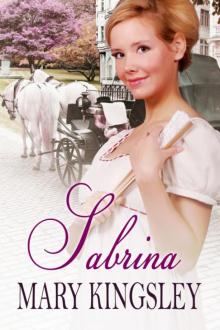 Sabrina
Sabrina Rogue's Charade
Rogue's Charade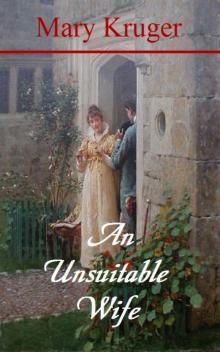 Unsuitable Wife
Unsuitable Wife In a Pirate's Arms
In a Pirate's Arms Crystal Heart
Crystal Heart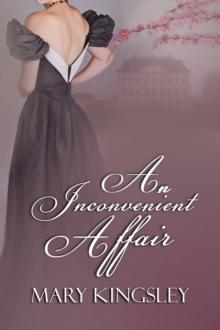 Inconvenient Affair
Inconvenient Affair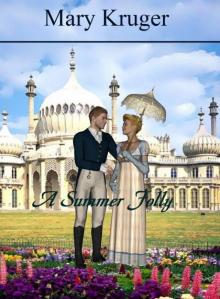 Summer Folly
Summer Folly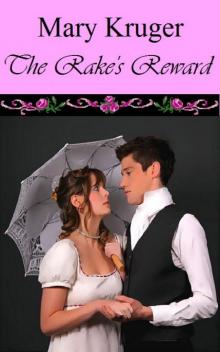 Rake's Reward
Rake's Reward Gifts of the Heart
Gifts of the Heart